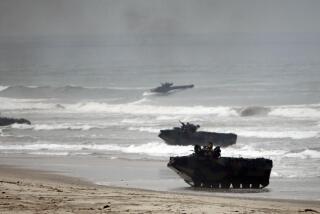Court-martial to begin for Camp Pendleton Marine in Iraqi killings
- Share via
Reporting from Camp Pendleton -- U.S. combat troops have departed from Iraq, but one last — and highly controversial — chapter of the long war there is being played out at Camp Pendleton.
After years of delay and legal wrangling, the court-martial of the last of eight Marines charged in the shooting deaths of 24 Iraqis in the village of Haditha in 2005 is under way — with Marines with combat experience sitting as jurors. Opening statements are expected to begin Friday.
Staff Sgt. Frank Wuterich, now 31, was on his first combat deployment when a roadside bomb killed one Marine and injured two others from his squad.
In search of the bombers, Marines killed five young men yanked from a car near the explosion and then killed 19 family members in three nearby houses. No suspects in the planting or detonating of the buried bomb were found.
Among the 19 killed in the houses were three women, seven children and a 76-year-old man confined to a wheelchair.
Of the seven other accused Marines, charges were dropped against six and one was found innocent. Charges against the battalion commander, Lt. Col. Jeffrey Chessani, were dropped but he was forced into retirement.
Three senior officers were not charged criminally but got career-ending letters of reprimand for not investigating the circumstances of the killings until the incident was splashed in Time magazine as “Massacre in Haditha.”
Wuterich is charged with dereliction of duty, voluntary manslaughter and assault. If he is convicted, the charges could carry up to 152 years in prison.
At a preliminary hearing in 2007, Wuterich admitted his role in killing the five men outside the car but denied killing anyone inside the houses. But as the squad leader, he gave the order that led Marines to burst into the houses.
“The four of us aggressively advanced” on the first house, Wuterich said in an unsworn statement in 2007 that cannot be used at the court-martial, “and on approach, I advised the team something like ‘shoot first and ask questions later’ or ‘don’t hesitate to shoot.’ ”
In the same statement, Wuterich said the five men outside the car had to be shot before they could run away and possibly detonate explosives hidden in their car.
“The threat had to be neutralized,” Wuterich said.
The hearing officer, while recommending that Wuterich be sent to court-martial, doubted that he would be convicted. The case against Wuterich, the hearing officer wrote, is riddled with the same problems that led to cases against the others being dropped: contradictory evidence, untrustworthy witnesses and poor forensics.
In hearings for other defendants, Marines testified about rushing into the homes, hearing the racking of AK-47s, being nearly blinded by smoke and deafened by noise as they fired their M-16s and tossed grenades.
One lance corporal, tears in his eyes and his voice breaking, testified in 2007 that, “It was dark. I couldn’t make out a lot — just targets.... I didn’t know there were women and children in that house until later.”
If Wuterich is convicted, the jury also will decide his penalty.
Regardless of how many counts end in a guilty verdict, jurors can choose not to impose a prison sentence, deciding instead that “the conviction itself is the punishment,” the court-martial judge, Lt. Col. David Jones, told the jury.
The convening authority, Lt. Gen. Thomas Waldhauser, can opt to reduce or overturn a conviction, and can reduce any punishment. But he cannot order a guilty verdict or increase the jury’s penalty if there is a conviction.
Wuterich, a native of Meriden, Conn., has been retained on active duty while the court case has gone through appeals. He has never been held in the brig. A divorced father of three children, Wuterich lives off-base and has a desk job with the 1st Marine Division.
On Thursday, prospective jurors were questioned by opposing attorneys. All but one indicated that he had been in combat in Iraq when an order was given to “clear” a house of insurgents; most had lost a Marine in combat.
Asked by a defense attorney, none admitted having “strong” feelings about the war in Iraq.
More to Read
Sign up for Essential California
The most important California stories and recommendations in your inbox every morning.
You may occasionally receive promotional content from the Los Angeles Times.













